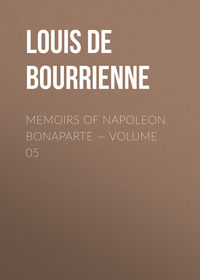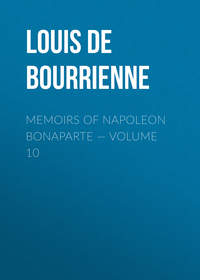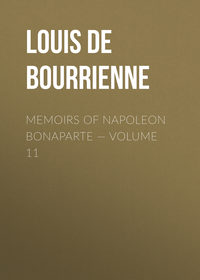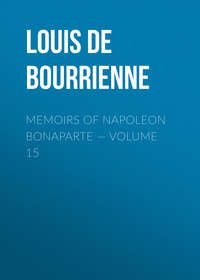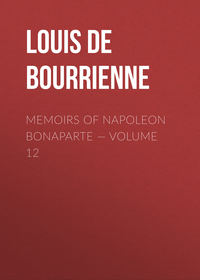 полная версия
полная версияMemoirs of Napoleon Bonaparte — Volume 03
From the time he received the accounts of the disaster of Aboukir until the revolt of Cairo on the 22d of October, Bonaparte sometimes found the time hang heavily on his hands. Though he devoted attention to everything, yet there was not sufficient occupation for his singularly active mind. When the heat was not too great he rode on horseback; and on his return, if he found no despatches to read (which often happened), no orders to send off; or no letters to answer, he was immediately absorbed in reverie, and would sometimes converse very strangely. One day, after a long pause, he said to me:
"Do you know what I am thinking of?"—"Upon my word, that would be very difficult; you think of such extraordinary things."—"I don't know," continued he, "that I shall ever see France again; but if I do, my only ambition is to make a glorious campaign in Germany—in the plains of Bavaria; there to gain a great battle, and to avenge France for the defeat of Hochstadt. After that I would retire into the country, and live quietly."
He then entered upon a long dissertation on the preference he would give to Germany as the theatre of war[9]; the fine character of the people, and the prosperity and wealth of the country, and its power of supporting an army. His conversations were sometimes very long; but always replete with interest.
[9]—[So early as 1794 Napoleon had suggested that Austria should always be attacked in Germany, not in Italy. "It is Germany that should be overwhelmed; that done, Italy and Spain fall of themselves. Germany should be attacked, not Spain or Italy. If we obtain great success, advantage should never be taken of it to penetrate into Italy while Germany, unweakened, offers a formidable front" (Iung's Bonaparte, tome ii. p. 936), He was always opposed to the wild plans which had ruined so many French armies in Italy, and which the Directory tried to force on him, of marching on Rome and Naples after every success in the north.]—
In these intervals of leisure Bonaparte was accustomed to retire to bed early. I used to read to him every evening. When I read poetry he would fall asleep; but when he asked for the Life of Cromwell I counted on sitting up pretty late. In the course of the day he used to read and make notes. He often expressed regret at not receiving news from France; for correspondence was rendered impracticable by the numerous English and Turkish cruisers. Many letters were intercepted and scandalously published. Not even family secrets and communications of the most confidential nature were respected.
About the middle of September in this year (1798), Bonaparte ordered to be brought to the house of Elfy Bey half a dozen Asiatic women whose beauty he had heard highly extolled. But their ungraceful obesity displeased him, and they were immediately dismissed. A few days after he fell violently in love with Madame Fourés, the wife of a lieutenant of infantry. She was very pretty, and her charms were enhanced by the rarity of seeing a woman in Egypt who was calculated to please the eye of a European. Bonaparte engaged for her a house adjoining the palace of Elfy Bey, which we occupied. He frequently ordered dinner to be prepared there, and I used to go there with him at seven o'clock, and leave him at nine.
This connection soon became the general subject of gossip at head-quarters. Through a feeling of delicacy to M. Fourés, the General-in-Chief gave him a mission to the Directory. He embarked at Alexandria, and the ship was captured by the English, who, being informed of the cause of his mission, were malicious enough to send him back to Egypt, instead of keeping him prisoner. Bonaparte wished to have a child by Madame Fourés, but this wish was not realised.
A celebrated soothsayer was recommended to Bonaparte by the inhabitants of Cairo, who confidentially vouched for the accuracy with which he could foretell future events. He was sent for, and when he arrived, I, Venture, and a sheik were with the General. The prophet wished first to exercise his skill upon Bonaparte, who, however, proposed that I should have my fortune told first, to which I acceded without hesitation. To afford an idea of his prophetic skill I must mention that since my arrival in Cairo I had been in a very weak state. The passage of the Nile and the bad food we had had for twelve days had greatly reduced me, so that I was miserably pale and thin.
After examining my hands, feeling my pulse, my forehead, and the nape of my neck, the fortune-teller shrugged his shoulders, and, in a melancholy tone, told Venture that he did not think it right to inform me of my fate. I gave him to understand that he might say what he pleased, as it was a matter of indifference to me. After considerable hesitation on his part and pressing on mine, he announced to me that the earth of Egypt would receive me in two months.
I thanked him, and he was dismissed. When we were alone the General said to me, "Well, what do you think of that?" I observed that the fortune-teller did not run any great risk in foretelling my death, which was a very probable circumstance in the state in which I was; "but," added I, "if I procure the wines which I have ordered from France, you will soon see me get round again."
The art of imposing on mankind has at all times been an important part of the art of governing; and it was not that portion of the science of government which Bonaparte was the least acquainted with. He neglected no opportunity of showing off to the Egyptians the superiority of France in arts and sciences; but it happened, oftener than once, that the simple instinct of the Egyptians thwarted his endeavours in this way. Some days after the visit of the pretended fortune-teller he wished, if I may so express myself, to oppose conjurer to conjurer. For this purpose he invited the principal sheiks to be present at some chemical experiments performed by M. Berthollet. The General expected to be much amused at their astonishment; but the miracles of the transformation of liquids, electrical commotions and galvanism, did not elicit from them any symptom of surprise. They witnessed the operations of our able chemist with the most imperturbable indifference. When they were ended, the sheik El Bekri desired the interpreter to tell M. Berthollet that it was all very fine; "but," said he, "ask him whether he can make me be in Morocco and here at one and the same moment?" M. Berthollet replied in the negative, with a shrug of his shoulders. "Oh! then," said the sheik, "he is not half a sorcerer."
Our music produced no greater effect upon them. They listened with insensibility to all the airs that were played to them, with the exception of "Marlbrook." When that was played they became animated, and were all in motion, as if ready to dance.
An order which had been issued on our arrival in Cairo for watching the criers of the mosques had for some weeks been neglected. At certain hours of the night these criers address prayers to the Prophet. As it was merely a repetition of the same ceremony over and over again, in a short time no notice was taken of it. The Turks, perceiving this negligence, substituted for their prayers and hymns cries of revolt, and by this sort of verbal telegraph, insurrectionary excitement was transmitted to the northern and southern extremities of Egypt. By this means, and by the aid of secret emissaries, who eluded our feeble police, and circulated real or forged firmans of the Sultan disavowing the concord between France and the Porte, and provoking war, the plan of a revolution was organised throughout the country.
The signal for the execution of this plan was given from the minarets on the night of the 20th of October, and on the morning of the 21st it was announced at headquarters that the city of Cairo was in open insurrection. The General-in-Chief was not, as has been stated, in the isle of Raeuddah: he did not hear the firing of the alarm-guns. He rose when the news arrived; it was then five o'clock. He was informed that all the shops were closed, and that the French were attacked. A moment after he heard of the death of General Dupuis, commandant of the garrison, who was killed by a lance in the street. Bonaparte immediately mounted his horse, and, accompanied by only thirty guides, visited all the threatened points, restored confidence, and, with great presence of mind, adopted measures of defence.
He left me at headquarters with only one sentinel; but he had been accurately informed of the situation of the insurgents; and such was my confidence in his activity and foresight that I had no apprehension, and awaited his return with perfect composure. This composure was not disturbed even when I saw a party of insurgents attack the house of M. Estève, our paymaster-general, which was situated on the opposite side of Ezbekye'h Place. M. Estève was, fortunately, able to resist the attack until troops from Boulac came up to his assistance.
After visiting all the posts, and adopting every precautionary measure, Bonaparte returned to headquarters. Finding me still alone with the sentinel, he asked me, smiling, "whether I had not been frightened?"— "Not at all, General, I assure you," replied I.
—It was about half-past eight in the morning when Bonaparte returned to headquarters, and while at breakfast he was informed that some Bedouin Arabs, on horseback, were trying to force their entrance into Cairo. He ordered his aide de camp, Sulkowsky, to mount his horse, to take with him fifteen guides, and proceed to the point where the assailants were most numerous. This was the Bab-el-Nasser, or the gate of victory. Croisier observed to the General-in-Chief that Sulkowsky had scarcely recovered from the wounds at Salehye'h, and he offered to take his place. He had his motives for this. Bonaparte consented; but Sulkowsky had already set out. Within an hour after, one of the fifteen guides returned, covered with blood, to announce that Sulkowsky and the remainder of his party had been cut to pieces. This was speedy work, for we were still at table when the sad news arrived.
Mortars were planted on Mount Mokatam, which commands Cairo. The populace, expelled from all the principal streets by the troops, assembled in the square of the Great Mosque, and in the little streets running into it, which they barricaded. The firing of the artillery on the heights was kept up with vigour for two days.
About twelve of the principal chiefs of Cairo were arrested and confined in an apartment at headquarters. They awaited with the calmest resignation the death they knew they merited; but Bonaparte merely detained them as hostages. The aga in the service of Bonaparte was astonished that sentence of death was not pronounced upon them; and he said, shrugging his shoulders, and with a gesture apparently intended to provoke severity, "You see they expect it."
On the third the insurrection was at an end, and tranquillity restored. Numerous prisoners were conducted to the citadel. In obedience to an order which I wrote every evening, twelve were put to death nightly. The bodies were then put into sacks and thrown into the Nile. There were many women included in these nocturnal executions.
I am not aware that the number of victims amounted to thirty per day, as Bonaparte assured General Reynier in a letter which he wrote to him six days after the restoration of tranquillity. "Every night," said he, "we cut off thirty heads. This, I hope, will be an effectual example." I am of opinion that in this instance he exaggerated the extent of his just revenge.
Some time after the revolt of Cairo the necessity of ensuring our own safety forced the commission of a terrible act of cruelty. A tribe of Arabs in the neighbourhood of Cairo had surprised and massacred a party of French. The General-in-Chief ordered his aide de camp Croisier to proceed to the spot, surround the tribe, destroy the huts, kill all the men, and conduct the rest of the population to Cairo. The order was to decapitate the victims, and bring their heads in sacks to Cairo to be exhibited to the people. Eugène Beauharnais accompanied Croisier, who joyfully set out on this horrible expedition, in hope of obliterating all recollection of the affair of Damanhour.
On the following day the party returned. Many of the poor Arab women had been delivered on the road, and the children had perished of hunger, heat, and fatigue. About four o'clock a troop of asses arrived in Ezbekye'h Place, laden with sacks. The sacks were opened and the heads rolled out before the assembled populace. I cannot describe the horror I experienced; but I must nevertheless acknowledge that this butchery ensured for a considerable time the tranquillity and even the existence of the little caravans which were obliged to travel in all directions for the service of the army.
Shortly before the loss of the fleet the General-in Chief had formed the design of visiting Suez, to examine the traces of the ancient canal which united the Nile to the Gulf of Arabia, and also to cross the latter. The revolt at Cairo caused this project to be adjourned until the month of December.
Before his departure for Suez, Bonaparte granted the commissary Sucy leave to return to France. He had received a wound in the right hand, when on board the xebec 'Cerf'. I was conversing with him on deck when he received this wound. At first it had no appearance of being serious; but some time after he could not use his hand. General Bonaparte despatched a vessel with sick and wounded, who were supposed to be incurable, to the number of about eighty. All envied their fate, and were anxious to depart with them, but the privilege was conceded to very few. However, those who were disappointed had no cause for regret. We never know what we wish for. Captain Marengo, who landed at Augusta in Sicily, supposing it to be a friendly land, was required to observe quarantine for twenty-two days, and information was given of the arrival of the vessel to the court, which was at Palermo. On the 25th of January 1799 all on board the French vessel were massacred, with the exception of twenty-one who were saved by a Neapolitan frigate, and conducted to Messing, where they were detained.
Before he conceived the resolution of attacking the Turkish advanced guard in the valleys of Syria, Bonaparte had formed a plan of invading British India from Persia. He had ascertained, through the medium of agents, that the Shah of Persia would, for a sum of money paid in advance, consent to the establishment of military magazines on certain points of his territory. Bonaparte frequently told me that if, after the subjugation of Egypt, he could have left 15,000 men in that country, and have had 30,000 disposable troops, he would have marched on the Euphrates. He was frequently speaking about the deserts which were to be crossed to reach Persia.
How many times have I seen him extended on the ground, examining the beautiful maps which he had brought with him, and he would sometimes make me lie down in the same position to trace to me his projected march. This reminded him of the triumphs of his favourite hero, Alexander, with whom he so much desired to associate his name; but, at the same time, he felt that these projects were incompatible with our resources, the weakness of the Government; and the dissatisfaction which the army already evinced. Privation and misery are inseparable from all these remote operations.
This favourite idea still occupied his mind a fortnight before his departure for Syria was determined on, and on the 25th of January 1799 he wrote to Tippoo Saib as follows:—
You are of course already informed of my arrival on the banks of the Red Sea, with a numerous and invincible army. Eager to deliver you from the iron yoke of England, I hasten to request that you will send me, by the way of Mascate or Mocha, an account of the political situation in which you are. I also wish that you could send to Suez, or Grand Cairo, some able man, in your confidence, with whom I may confer[10].
[10]—[It is not true, as has often been stated, that Tippoo Saib wrote to General Bonaparte. He could not reply to a letter written on the 23th of January, owing to the great difficulty of communication, the considerable distance, and the short interval which elapsed between the 25th of January and the fall of the Empire of Mysore, which happened on the 20th of April following. The letter to Tippo Saib commenced "Citizen-Sultan!"—Bourrienne]—
CHAPTER XVII
1798-1799.
Bonaparte's departure for Suez—Crossing the desert—Passage of the Red Sea—The fountain of Moses—The Cenobites of Mount Sinai—Danger in recrossing the Red Sea—Napoleon's return to Cairo—Money borrowed at Genoa—New designs upon Syria—Dissatisfaction of the Ottoman Porte—Plan for invading Asia—Gigantic schemes—General Berthier's permission to return to France—His romantic love and the adored portrait—He gives up his permission to return home—Louis Bonaparte leaves Egypt—The first Cashmere shawl in France— Intercepted correspondence—Departure for Syria—Fountains of Messoudish—Bonaparte jealous—Discontent of the troops—El-Arish taken—Aspect of Syria—Ramleh—Jerusalem.
On the 24th of December we set out for Suez, where we arrived on the 26th. On the 25th we encamped in the desert some leagues before Ad-Geroth. The heat had been very great during the day; but about eleven at night the cold became so severe as to be precisely in an inverse ratio to the temperature of the day. This desert, which is the route of the caravans from Suez, from Tor and the countries situated on the north of Arabia, is strewed with the bones of the men and animals who, for ages past, have perished in crossing it. As there was no wood to be got, we collected a quantity of these bones for fuel. Monge himself was induced to sacrifice some of the curious skulls of animals which he had picked up on the way and deposited in the Berlin of the General-in-Chief. But no sooner had we kindled our fires than an intolerable effluvium obliged us to raise our camp and advance farther on, for we could procure no water to extinguish the fires.
On the 27th Bonaparte employed himself in inspecting the town and port of Suez, and in giving orders for some naval and military works. He feared—what indeed really occurred after his departure from Egypt—the arrival of some English troops from the East Indies, which he had intended to invade. These regiments contributed to the loss of his conquest[11].
[11]—[Sir David Baird, with a force of about 7000 men sent from India, landed at Cosseir in July 1801.]—
On the morning of the 28th we crossed the Red Sea dry-shod, to go to the Wells of Moses, which are nearly a myriametre from the eastern coast, and a little southeast of Suez. The Gulf of Arabia terminates at about 5,000 metres north of that city. Near the port the Red Sea is not above 1,500 metres wide, and is always fordable at low water. The caravans from Tor and Mount Sinai[12] always pass at that part, either in going to or returning from Egypt. This shortens their journey nearly a myriametre. At high tide the water rises five or six feet at Suez, and when the wind blows fresh it often rises to nine or ten feet.
[12]—[I shall say nothing of the Cenobites of Mount Sinai, as I had not the honour of seeing them. Neither did I see the register containing the names of Ali, Salah-Eddin, Ibrahim or Abraham, on which Bonaparte is said to have inscribed his name. I perceived at a distance some high hills which were said to be Mount Sinai. I conversed, through the medium of an interpreter, with some Arabian chiefs of Tor and its neighbourhood. They had been informed of our excursion to the Wells, and that they might there thank the French General for the protection granted to their caravans and their trade with Egypt. On the 19th of December, before his departure from Suez, Bonaparte signed a sort of safeguard, or exemption from duties, for the convent of Mount Sinai. This had been granted out of respect to Moses and the Jewish nation, and also because the convent of Mount Sinai is a seat of learning and civilisation amidst the barbarism of the deserts.—Bourrienne.]—
We spent a few hours seated by the largest of the springs called the Wells of Moses, situated on the eastern shore of the Gulf of Arabia. We made coffee with the water from these springs, which, however, gave it such a brackish taste that it was scarcely drinkable.
Though the water of the eight little springs which form the Wells of Moses is not so salt as that of many wells dug in other parts of the deserts, it is, nevertheless, exceedingly brackish, and does not allay thirst so well as fresh water.
Bonaparte returned to Suez that same night. It was very dark when we reached the sea-shore. The tide was coming up, and the water was pretty high. We deviated a little from the way we had taken in the morning; we crossed a little too low down; we were thrown into disorder, but we did not lose ourselves in the marshes as has been stated. There were none.
I have read somewhere, though I did not see the fact, nor did I hear it mentioned at the time, that the tide, which was coming up, would have been the grave of the General-in-Chief had not one of the guides saved him by carrying him on his shoulders. If any such danger had existed, all who had not a similar means of escape must have perished.
This is a fabrication. General Caffarelli was the only person who was really in danger, for his wooden leg prevented his sitting firmly on his horse in the water; but some persons came to his assistance and supported him[13].
[13]—[Bonaparte extricated himself as the others did from the real danger he and his escort had run. At St. Helena he said, "Profiting by the low tide, I crossed the Red Sea dry-shod. On my return I was overtaken by the night and went astray in the middle of the rising tide. I ran the greatest danger. I nearly perished in the same manner as Pharaoh did. This would certainly have furnished all the Christian preachers with a magnificent test against me." —Bourrienne.]—
On his return to Cairo the General-in-Chief wished to discover the site of the canal which in ancient times formed a junction between the Red Sea and the Nile by Belbeis. M. Lepère, who was a member of the Egyptian Institute, and is now inspector-general of bridges and highways, executed on the spot a beautiful plan, which may confidently be consulted by those who wish to form an accurate idea of that ancient communication, and the level of the two seas[14].
[14]—[Since accurately ascertained during the progress of the works for the Suez Canal.]—
On his arrival at the capital Bonaparte again devoted all his thoughts to the affairs of the army, which he had not attended to during his short absence. The revenues of Egypt were far from being sufficient to meet the military expenditure. To defray his own expenses Bonaparte raised several considerable loans in Genoa through the medium of M. James. The connection of James with the Bonaparte family takes its date from this period[15].
[15]—[Joseph Bonaparte says that the fathers of Napoleon and of M. James had long known one another, and that Napoleon had met James at Autun. ('Erreurs', tome i, p. 296).]—
Since the month of August the attention of General Bonaparte had been constantly fixed on Syria. The period of the possible landing of an enemy in Egypt had now passed away, and could not return until the month of July in the following year. Bonaparte was fully convinced that that landing would take place, and he was not deceived. The Ottoman Porte had, indeed, been persuaded that the conquest of Egypt was not in her interest. She preferred enduring a rebel whom she hoped one day to subdue to supporting a power which, under the specious pretext of reducing her insurgent beys to obedience, deprived her of one of her finest provinces, and threatened the rest of the empire.
On his return to Cairo the General-in-Chief had no longer any doubt as to the course which the Porte intended to adopt. The numerous class of persons who believed that the Ottoman Porte had consented to our occupation of Egypt were suddenly undeceived. It was then asked how we could, without that consent, have attempted such an enterprise? Nothing, it was said, could justify the temerity of such an expedition, if it should produce a rupture between France, the Ottoman empire, and its allies. However, for the remainder of the year Bonaparte dreaded nothing except an expedition from Gaza and El-Arish, of which the troops of Djezzar had already taken possession. This occupation was justly regarded as a decided act of hostility; war was thus practically declared. "We must adopt anticipatory measures," thought Napoleon; "we must destroy this advanced guard of the Ottoman empire, overthrow the ramparts of Jaffa and Acre, ravage the country, destroy all her resources, so as to render the passage of an army across the desert impracticable." Thus was planned the expedition against Syria.



